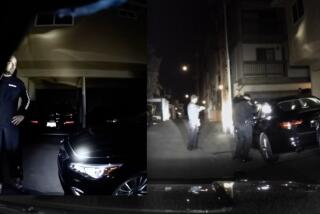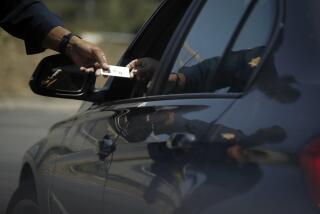Lawmakers Say They’ve Been Driven to Fight Racial Profiling
- Share via
WASHINGTON — Elijah E. Cummings is a former prosecutor, Maryland state legislator and currently a third-term Democratic congressman representing a Baltimore city district.
But three days after buying a black Acura in 1991, Cummings was pulled over by a state trooper as he cruised to work on Capitol Hill. During the next year, he was pulled over an average of once a month as he commuted the 100 miles round-trip between his home and office. Even now, Cummings said, he’s stopped about four or five times a year.
He never receives a ticket. No reason is offered and rarely is an apology made for the inconvenience. Typically, the officer is white, but sometimes, like him, an African American. Almost always, the officer’s mantra is the same: “Just checking” to make sure the car wasn’t stolen.
Cummings joins a convoy of black and Latino lawmakers who say they have been victims of racial profiling, an oft-criticized police strategy of using race or ethnicity to target drivers for random stops. While he and many of his black and Latino colleagues wield influence inside Washington, they are not spared the humiliation of having police pull them over at random. They fit the profile that police look for in trying to stop the illicit drug trade: young, dark and in a jazzy car.
A Times survey of black and Latino congressional leaders found that most of them either have been singled out themselves or know someone who has been stopped by police for DWB, or “Driving While Black/Brown.” Among the 39 black lawmakers serving in the 106th Congress, 18 said they or someone in their immediate family had been stopped for no reason other than the color of their skin.
“This is something that’s been plaguing me ever since I started driving,” Cummings said. “Black men understand this. It’s a part of our lives. If you’re a black man, even if you’re a member of Congress, a cop is going to pull you over.”
Numbers among Latino lawmakers are not as high, in part because many are light-skinned. Still, three of the 19 Latino House members reported that either they or members of their family had been unfairly hassled in traffic stops.
As a result, these lawmakers say, their effort to end racial profiling is more than business as usual--it’s personal.
In fact, the lawmakers’ response to racial profiling on the nation’s highways coincides with a spike in public attention on police treatment of minorities. In New York, activists have turned out by the hundreds to protest the killing of Amadou Diallo, whom police shot 41 times after mistaking him for a rape suspect. The Diallo case has generated national attention on police procedures, especially when they make life-or-death decisions about suspects.
In Washington, President Clinton and Atty. Gen. Janet Reno have spoken out against racial profiling. In New Jersey, the profiling issue is so politically sensitive that Gov. Christine Todd Whitman fired State Police Supt. Col. Carl Williams after he admitted that state police associate certain crimes with some races.
“The president of the United States went to Mexico to talk to the president of Mexico about drugs,” Williams said in an interview with the Star-Ledger newspaper in Newark, N.J. “He didn’t go to Ireland. He didn’t go to England.”
Williams’ remarks came during a two-month investigation of police profiling practices, which revealed that more than three-quarters of the cars searched in New Jersey during the period were driven by blacks or Latinos.
Officials in New Jersey since have acknowledged that some state troopers used racial profiling in making traffic stops. In other states, such as California and North Carolina, legislatures have bills pending to impose stricter guidelines on traffic stops. And a few areas, such as San Diego and Maryland’s Montgomery County, have ordered police to maintain public records of traffic stops to determine whether officers are targeting minority drivers.
Last month, Rep. John Conyers Jr. (D-Mich.) introduced the Traffic Stops Statistics Act of 1999, calling for a nationwide study requiring law enforcement officials to document the race, gender, ethnicity and age of drivers stopped. Conyers, who has never been stopped for DWB, ushered similar legislation through the House last year, but it failed in the Senate.
Given the increased attention to the issue, Conyers is more hopeful that his bill will pass this time around. “This legislation will allow us to ascertain the extent such profiling is occurring on a nationwide basis, help increase police awareness of the problem and determine if any broader response is warranted,” he said.
Many opponents say the bill is unnecessary paperwork, agreeing with police officials who say officers aren’t trained to use race as a cause for traffic stops.
In their defense, police officials across the country say that they don’t automatically assume racial minorities are criminals but often use some forms of profiling to help spotlight potential lawbreakers.
“We don’t train police officers to act on race or their racial prejudices,” said Ron Neubauer, president of the International Assn. of Chiefs of Police. But he acknowledged that race can prompt investigation--such as a car with three whites cruising a black neighborhood at 2:30 a.m.
Fear and Pain Rooted in Experience
In interview after interview with The Times, black and Latino lawmakers said their vote on proposed federal legislation is likely to be influenced by their fear and pain rooted in real-life experiences. Alternating between humor and outrage, lawmakers detailed stories of their own helplessness when stopped by police officers.
In most cases, the stories stem from when they were younger, closer in appearance to the “profile” for a drug trafficker. But even congressional license tags haven’t stopped negative treatment, some say.
“I’ve been stopped since I’ve been in Congress,” said Rep. John Lewis (D-Ga.), who is serving his seventh term. “The officer stopped us as we were driving between Montgomery, Ala., and Atlanta about 3 1/2 years ago. He questioned us about drinking, but we hadn’t been. He then wanted to know if we were playing the radio in the car. When I showed him my congressional identification, he said go on.”
Lewis, who often traveled the same route in fear during his civil rights activities in the late ‘50s and through the ‘60s, said the officer was a throwback to an earlier generation. “If I had been another color, I wouldn’t have been stopped. I thought we had passed this period, but you seem to see more of it now,” he said.
Rep. Robert Menendez (D-N.J.), who is a co-sponsor of the Conyers bill, said he’s never been pulled over for racial profiling, but many of his constituents have.
“It is not a crime for a black or Hispanic American to own a luxury car,” he said. “But if you are a minority driver in my state on the New Jersey Turnpike, you might think that it is. . . . Minority motorists are guilty until proven innocent.”
On one occasion, said Rep. Danny K. Davis (D-Ill.), an officer was brutally frank about why he had pulled him over. “I asked him why he stopped me,” Davis said, laughing and shaking his head at the memory. “He said, ‘You were black and you have a beard, you know, I was looking for somebody.’ ”
Davis, who was serving on the Chicago City Council at the time, said the officer explained that he was driving an old car and it fit a certain profile. “This is one of the most insidious issues that exists in terms of the differentials of how people are treated and the whole question of equal justice,” he said.
Rep. Ciro Rodriguez (D-Texas), a two-termer who was born in Mexico and represents a San Antonio district, recalled returning by car across the Mexican border about six years ago, before he was in Congress, when a Border Patrol officer ordered him out of his car and to speak English.
“I asked him why should I have to speak English,” Rodriguez said. The officer only told him to obey or else.
Rep. Harold E. Ford Jr. (D-Tenn.), who at age 28 is one of the youngest members of Congress, said he was stopped by a police officer after jumping out of his car driven by his chief of staff at Reagan National Airport. “He demanded to see identification, and when I showed it to him, he couldn’t believe it was my car and that I was a member of Congress. He detained me for about 15 minutes, even though I told him I was rushing to catch a plane. Finally, he let me go. No apology or nothing.
“It really hurt me. If I’m treated like this, I can imagine how folks who don’t have access to the things I do as a member of Congress are treated.”
More to Read
Sign up for Essential California
The most important California stories and recommendations in your inbox every morning.
You may occasionally receive promotional content from the Los Angeles Times.










